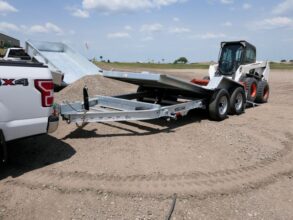Irrigation’s Finest Rise to the Top
By Luke Frank
Although every project is a pleasure, there periodically surfaces those landscape and irrigation undertakings that we work hard to become a part of. Such projects demand both creativity and precision, and afford one the opportunity to showcase both experience and talent in abundance.
Each year, the American Society of Irrigation Consultants (ASIC) – a 40-year-old professional association whose members take on the most complex, large-scale outdoor water development and delivery projects the world over – hosts its Excellence in Irrigation Awards to unearth the season’s most sophisticated irrigation projects.
Another impressive slate of irrigation professionals submitted landmark projects this year. The winners are as follows:
ASIC Honor Award Winners
Trump Tower, Chicago
Jeffrey L. Bruce & Company of North Kansas City, Mo., and Peter Schaudt Landscape Architects of Chicago, are being recognized this year with ASIC’s Excellence in Irrigation Honor Award for an especially innovative approach to water management and irrigation engineering for Trump Tower’s Riverwalk and plaza gardens at the lowest level, and the three green roofs on the tower’s upper floor.
The irrigation system for this Windy City landmark was designed as an integral part of the site’s basic infrastructure. Not a single trencher or shovel was used to install this miles-long, vertical landscape irrigation system. Most of the pipe was hung from structures below, or the adjacent bridges; or embedded into the lightweight concrete structural deck slab. Pipe also was sleeved and placed around large structural columns. To meet seasonal requirements, irrigation quick-connects simplify exchanging seasonal planters.
“The irrigation design transformed this institutional spire of angled concrete and steel to a living, breathing, cultural business center,” said Jeffrey Bruce, ASIC Professional Irrigation Consultant. “Water is efficiently transported through miles of irrigation piping integrated into the structure and controlled from a central computer.”
From the dog park at the lowest level to the three green roofs on the tower’s upper floor, the irrigation system for this new Chicago landmark was designed as an integral part of the site’s infrastructure.
The Lovett School, Atlanta
Irrigation Consultants, Inc., in Conyers, Ga., also earned an ASIC Excellence Honor Award for the Lovett School upgrade project in Atlanta, which includes a sizeable water-harvesting demonstration project for students.
A challenging project from the onset, Lovett School required the integration of several outdated irrigation systems into a single high-performance system capable of meeting LEED Gold certification. To minimize potable water use on the site, a large-capacity water-harvesting system was developed for the athletic fields, while also serving as an educational tool for students.
The water-harvesting system collects precipitation from rooftops and condensation as alternative water sources, which are stored in a large above-ground tank. All water leaving the athletic field site — above and below ground — is being harvested for future use. A river transfer pump provides yet an additional source of non-potable water.
“Lovett School had the foresight to create a very visual, hands-on educational tool for its students,” said Robert Scott, president of Irrigation Consultants, Inc. “We’re protecting the resource while providing green space and recreational facilities. Everybody wins.”
ASIC Merit Award Winners
Shangri La Botanical Gardens and Nature Center, Orange, Texas
Aqua Engineering in Fort Collins, Colo., delivered tremendous resource sensitivity and irrigation performance — enough to achieve LEED Platinum status for a renowned nature center in the Lone Star State.
Nestled within 252 acres of land hosting diverse native flora and fauna, Shangri La Botanical Gardens and Nature Center in Orange, Texas, is irrigated by collected rainwater stored in multiple above-ground galvanized tanks. The project includes an extensive botanical garden, children’s interactive garden, plant research facilities, two cafes, and demonstration gardens. The visitor center is the first facility in Texas to achieve LEED Platinum status.
The nature center complex utilizes plants irrigated either solely by collected rainwater and natural rainfall or non-irrigated indigenous plant species, and features a water- and energy-conserving irrigation system that efficiently supports the center’s high aesthetics.
“Shangri La exemplifies the highest metrics of irrigation performance in a sensitive, stealth manner,” said Terry Little, Professional Irrigation Consultant with Aqua Engineering. “Achieving Platinum LEED status took tremendous cooperation among designers and planners. We would like to thank our client, Mesa Design Associates of Dallas, Texas, for including us in this award-winning team.”
Fairground Parks, Loveland, Colo.
Aqua Engineering also received a Merit Award for its work at Fairgrounds Park in Loveland, CO, which incorporated both alternative water sources and drip irrigation for turf in its unique irrigation system design.
Fairgrounds Park has a renewed mission as a community park and sports complex using water-storage ponds and supplemental water from the Big Thompson River. The project utilizes these two alternative water sources to irrigate the new community park and sports complex and to service an existing park and ball-field irrigation system.
Underground, in-line drip irrigation installed for small turf areas eliminates overhead-sprinkler waste while reducing potential injuries and vandalism. A sophisticated, variable-speed pumping system is also incorporated to adjust power needs according to demand, to help conserve electricity on the site.
Aqua Engineering’s development of the alternative water supply and augmentation plan, which also connects an existing irrigation system to the new one, has resulted in significant annual savings for the City of Loveland.
“Fairgrounds Park has been converted from a sparsely used public facility to a beautiful community park and sports complex,” said Seth Samsell, Aqua Engineering project manager. “By better routing onsite water resources through an efficient delivery system, the community enjoys a more pristine facility at a lower management cost. That’s good for everyone.”
Camelback Ranch MLB spring training facility, Glendale, Ariz.
Yes, there’s a pattern here. Aqua Engineering also was recognized for its work at the Camelback Ranch Facility in Glendale, Ariz. Camelback Ranch uses a water-storage lake, pumping system, and irrigation system to efficiently hold then deliver reclaimed water for a state-of-the-art spring training facility operated by the Los Angeles Dodgers and Chicago White Sox.
The project incorporates a sophisticated pump control system for automatic lake-fill. The pump station also addresses three water-delivery conditions from a single location: a lake recirculation system; an aesthetic water feature recirculation system; and a high-pressure, high-volume irrigation pumping system. Irrigation is managed through a central computer with integrated weather station, which enables precision watering according to daily on-site evaporation and plant transpiration rates.
“Camelback Ranch Training Facility uses a combination of the most modern irrigation technology available to provide a healthy, safe venue for the professional athletes and the public,” said Doug Macdonald, Aqua Engineering vice president. “Using recycled water creates a balance between maximizing water resources in the desert and sustaining recreational green space in the community.”
Nelson-Atkins Museum of Art, Kansas City
Yet another pattern emerges with Jeffrey L. Bruce & Company and Kansas City’s Nelson-Atkins Museum of Art, where precision irrigation control was absolutely required to protect thousands of centuries-old cultural and aesthetic artifacts.
Opened in 1933, The Nelson-Atkins Museum takes its mission very seriously — it is dedicated to the enjoyment and understanding of the visual arts and the varied cultures they represent. The museum maintains collections of more than 33,500 works of art.
Irrigation water is not considered a friend to the many outdoor exhibits meandering throughout garden areas. Accordingly, the entire campus was considered holistically, rather than focusing on individual irrigation systems.
The museum grounds have significantly different water requirements, which are a direct relationship of the soil profiles throughout the site, including narrow-profile green roof soils, engineered sand-based soils, and native topsoil areas. Improvement strategies — including routine maintenance scheduling; optimal operational watering windows; and identification of hydrozones based on plant type, plant density, and microclimate — were analyzed in depth to determine financial and maintenance impacts of lifecycle decisions. The Nelson-Atkins Museum irrigation project provides a central control design to unite six separate irrigation systems covering 22 acres brought online over the last 22 years.
“The central control irrigation design supports a dynamic landscape on top of, and adjacent to, a priceless art collection in a world-renowned cultural venue,” said Bruce. “The site is fitted with pinpoint irrigation accuracy and a consistent program to evaluate future irrigation expansion projects, while conserving and reducing existing water use and labor costs.”
ASIC’s annual National Excellence in Irrigation Awards recognize the sound science and judgment required of an independent irrigation consultant. Each year, Honor and Merit Awards, independently judged by professors of irrigation science at Cal Poly Pomona, are given based on the quality of project planning and design in functionalism, environmental responsibility and relevance.
“Each recipient showed tremendous skill and versatility in master planning or analyzing the needs of large, demanding irrigation projects with challenging site conditions to the satisfaction of multiple constituents,” said Norman Bartlett, ASIC executive director. “Creating logical water solutions to such large, complex projects clearly demonstrates the skill and innovation of this year’s award winners.”
ASIC’s Annual Excellence in Irrigation Awards are coming again. If you’ve crossed paths with a project that demanded both irrigation creativity and precision, consider submitting your project next year. It’s your opportunity to show the industry and the public your abundant experience and talent.
Luke Frank, communications director for the American Society of Irrigation Consultants (ASIC), is a writer, editor and publisher in the green industry focusing on water resource development, management and conservation. ASIC is an organization of professionals within the irrigation industry that provides a forum wherein irrigation design professionals can meet to exchange information and advance skills and techniques in irrigation design, installation and product application. For more information, visit www.asic.org


